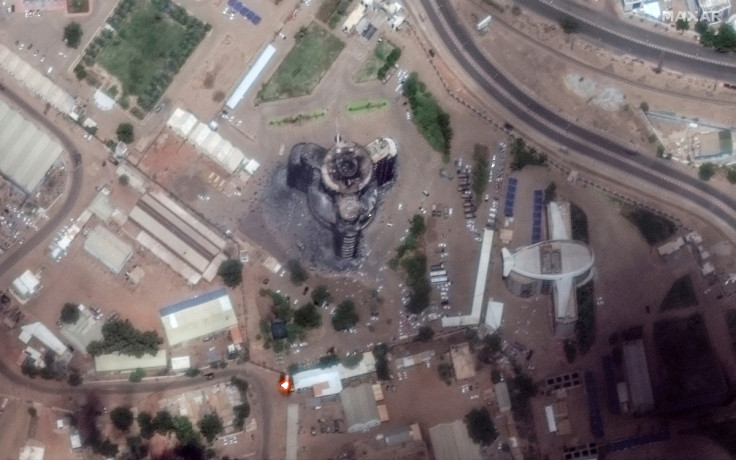How Sudan's Paramilitary Forces Took Parts Of Khartoum, Stormed Army Chief's Quarters

When conflict flared in Khartoum almost a month ago, pitting Sudan's armed forces and their heavy weaponry against a paramilitary force born out of an agile but lightly-armed desert militia, it looked like it might prove a one-sided fight.
But the head of the army, General Abdel Fattah al-Burhan, swiftly found air power and artillery alone could not stop his rival's men, who were able to storm into Burhan's residence deep within army headquarters in the first hours of the conflict that erupted on April 15, a total of ten sources, from both sides of the conflict, told Reuters.
Burhan, the de facto head of state, himself picked up an AK-47 rifle and opened fire before his security pulled him to safety, one of his bodyguards told Reuters, in previously unreported details of how close he came to being toppled, or killed, in those first days.
More than 30 of his guards died in the ensuing battle, before the Rapid Support Forces (RSF) fighters retreated from the residence in the capital, said the bodyguard, who asked not to be named.
Reuters was unable to reach representatives of the army and the RSF for comment about the events at the presidential residence, or about the strategy of the two sides.
The account highlights the preferred tactic of Burhan's opponent General Mohamed Hamdan Dagalo, known as Hemedti, namely fighting at close quarters and playing to the strengths of his RSF.
Almost a month after the fighting began, and despite almost daily air strikes, the army has not dislodged the RSF from the capital, where its men have taken up positions in residential areas and several key institutions.
Over the past decade, the RSF grew out of a ragtag force of desert fighters to become virtually a parallel military with bases in the capital - quickly abandoned when fighting began - and with enough supplies to force Burhan to talks without hope of winning a quick victory.
The conflict has left ordinary Sudanese, many of whom have flooded out of the capital, some to friends and family in more rural areas and others across the borders to neighbouring states, questioning how a rival to the military was allowed to materialise over the past several years.
"Why did the army let Hemedti become a parallel army and threatening the normal people. Where were the leaders of the army?" said Hussein Ahmed, in a long queue at a bakery.
For troops in the RSF, which grew out for the Janjaweed, a feared horse-mounted Arab militia that helped the government quell a previous uprising in Sudan's western region of Darfur and was rewarded by being formalised as a paramilitary force, the goal is to keep drawing the army into urban warfare where their lightly armed vehicles stand a better chance against tanks and warplanes.
"We need Burhan and his troops to fight us face to face not with air strikes and drones. They have to be brave," said one RSF soldier at a checkpoint in Khartoum.
SPREAD OUT
RSF fighters have scattered from their bases in the capital, which are exposed to air strikes, and have instead taken refuge in houses, kicking out residents. They park their vehicles close to houses to discourage air strikes, residents say.
While Hemedti has tens of thousands of troops in Khartoum, Burhan's larger forces are distributed nationwide and are rarely seen in the capital, giving their foes room to dig in.
Hemedti's men have occupied state buildings such as the Interior Ministry, police buildings and grabbed large supplies of fuel from the oil refinery, as well as banks. The RSF have deployed snipers on rooftops.
Other RSF members took over houses in upscale area of Khartoum. Like Hemedti, many of his fighters are from Rizeigat, the largest Arab tribe in Darfur, and are loyal to him.
To tighten their control, they have set up checkpoints across Khartoum, looking at IDs and searching cars, and baggage. RSF fighters open mobile phones to look for army contacts, residents say.
Residents of the capital have accused them of looting, which the RSF has denied.
FORMER ALLIES
The conflict followed the collapse of an internationally backed plan for a transition to democracy.
For the four years since former president Omar al-Bashir was toppled in a popular uprising, the army and the RSF have uneasily shared power.
Burhan heads a ruling council installed after the 2019 ouster of long-time autocrat Omar al-Bashir and a 2021 military coup. Hemedti, who made his name in the Darfur conflict and was accused of atrocities, had been his deputy.
Prior to the fighting, Hemedti, a former camel trader with little formal education, had been taking steps like moving closer to a civilian coalition that indicated he had political plans after the stalled transition to democracy. Burhan has blamed the fighting on his rival's "ambitions."
Hemedti, who became rich from the gold trade, is playing a long game, a war of attrition designed to open up an opportunity for him to be a political leader through negotiations, sources close to Hemedti said.
The battles since mid-April have killed at least 500 people and wounded thousands, disrupted aid supplies, sent 100,000 refugees fleeing abroad and turned residential areas of Khartoum into war zones.
Hemedti has vowed to either capture or kill Burhan, and both sides have violated numerous ceasefires.
Reuters could not establish where Hemedti is currently operating from, or whether Burhan was still using army headquarters as his base of operations. Neither side has revealed how many of their fighters have been killed.
(Writing by Michael Georgy; Editing by Frank Jack Daniel)

© Copyright Thomson Reuters 2025. All rights reserved.





















